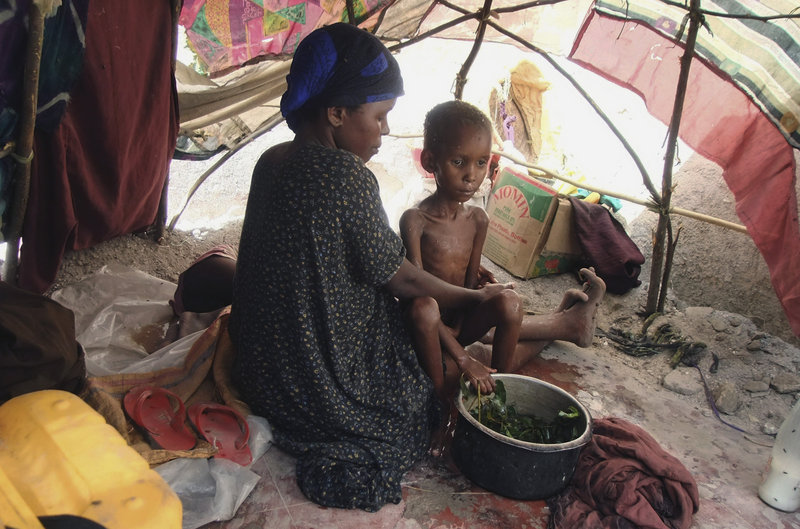DOLO, Somalia – The U.N. will airlift emergency rations this week to parts of drought-ravaged Somalia that militants banned it from more than two years ago — a crisis intervention to keep hungry refugees from dying along what an official calls the “roads of death.”
The foray into the famine zone is a desperate attempt to reach at least 175,000 of the 2.2 million Somalis whom aid workers have not yet been able to help.
Tens of thousands already have trekked to neighboring Kenya and Ethiopia, hoping to get aid in refugee camps.
Some — like Isaac Bulle and his family — have nearly nothing left.
“I hope we can cross to Ethiopia, but if we can get help here, we will stay here,” said Bulle, who traveled with his two wives and 14 children for 25 days by donkey cart to reach this border town. “Our aim is just to get food. Not to leave the country.”
Restarting the aid effort is a huge challenge for the World Food Program, whose workers were previously banned from the region by the al-Qaida-linked militant group al-Shabab. Fourteen WFP employees have been killed in Somalia since 2008. New land mines have severed a key road to Dolo. A landing strip has fallen into disrepair. Old employees must be found and rehired.
The new feeding efforts in the four districts of southern Somalia near the border with Kenya and Ethiopia could begin by Thursday, slowing the flow of tens of thousands of people who have fled their homes in hope of reaching aid.
The Bulle family is parked under the thorny branches of an acacia tree one river crossing from refugee camps in the Ethiopian town of Dollo Ado. They sleep on two tiny straw mats, although the youngest are bedding down on the rocky sand.
Bulle once had 50 cattle, some goats and grew sorghum. But the rains stopped two years ago, and food supplies stored in a cellar lasted the family a year. Then the animals began to die, forcing him to pack up.
When asked how much money he had, Bulle pulls out a wad of Somali shillings — representing the equivalent of 80 cents.
His whole family survived the journey with no one getting hurt, killed or left behind. However, U.N. worker Abdi Nur said that although Bulle was “clever” to pack just enough food to make it, he pointed to the farmer’s young children gathered under the acacia tree.
“The kids are getting thinner. You can see,” Nur said. “They are getting malnourished.”
Copy the Story Link
Send questions/comments to the editors.



Success. Please wait for the page to reload. If the page does not reload within 5 seconds, please refresh the page.
Enter your email and password to access comments.
Hi, to comment on stories you must . This profile is in addition to your subscription and website login.
Already have a commenting profile? .
Invalid username/password.
Please check your email to confirm and complete your registration.
Only subscribers are eligible to post comments. Please subscribe or login first for digital access. Here’s why.
Use the form below to reset your password. When you've submitted your account email, we will send an email with a reset code.